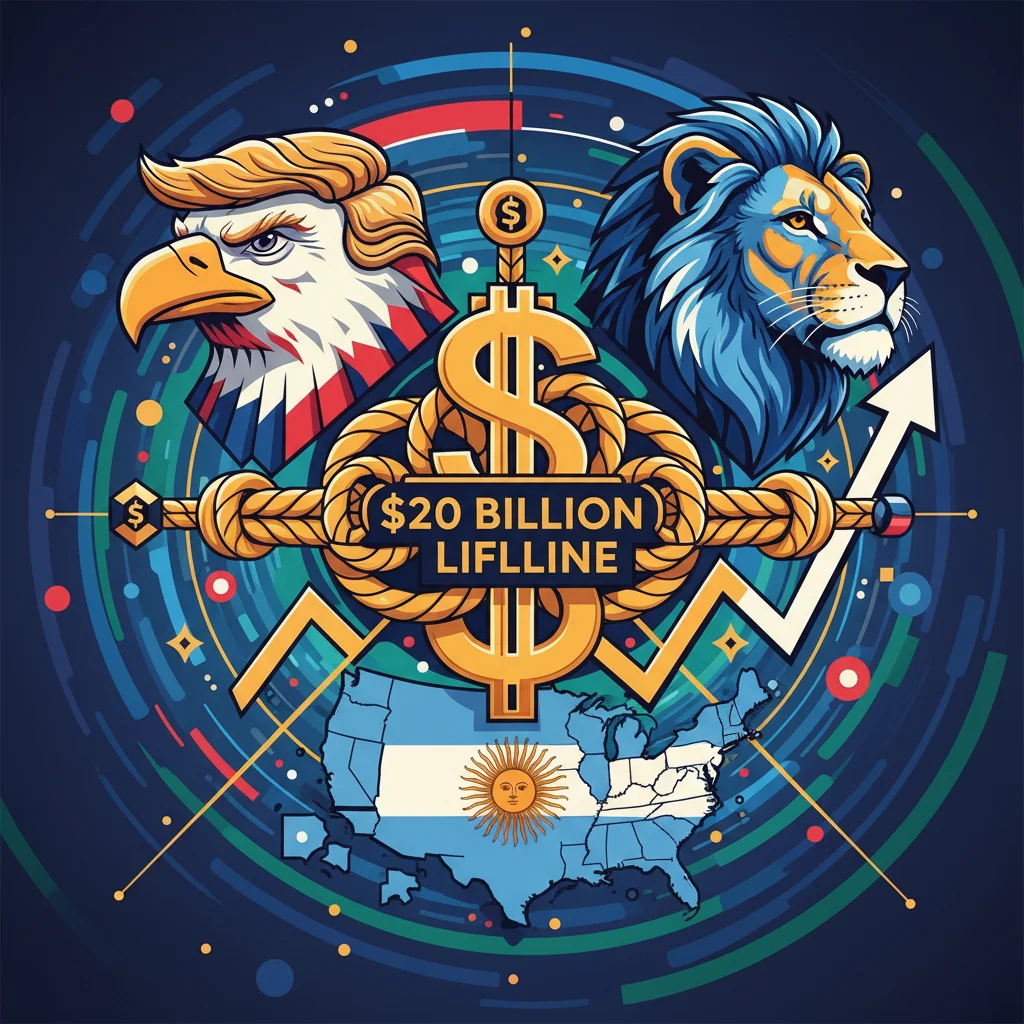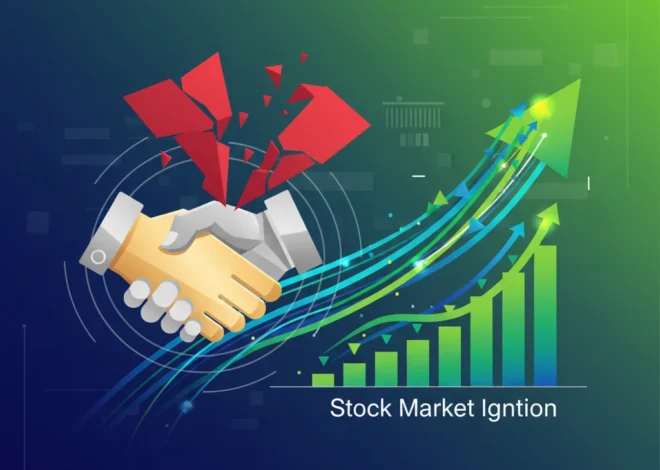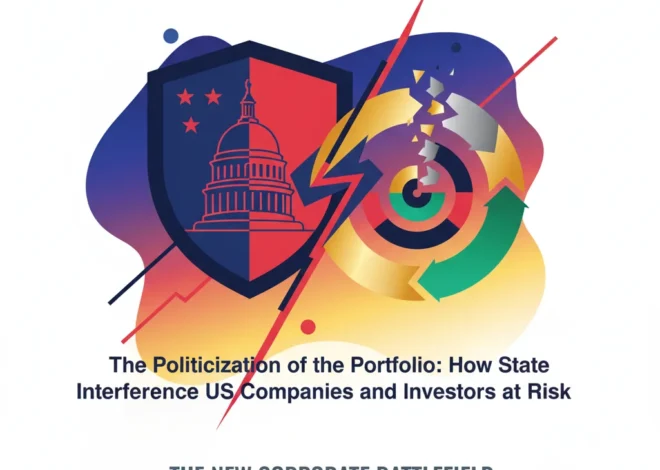
The Trump-Milei Gambit: Is a $20 Billion Lifeline Tying Argentina’s Economic Fate to US Politics?
In the high-stakes world of international finance and geopolitics, a handshake or a public statement can be worth billions. A recent declaration by former U.S. President Donald Trump has sent ripples through the financial world, directly linking a potential multi-billion-dollar support package for Argentina to the political fortunes of its libertarian president, Javier Milei. The proposal involves a massive $20 billion currency swap line, a financial lifeline that could stabilize Argentina’s beleaguered economy. However, Trump has made it clear that this support is contingent on Milei’s success in the 2025 midterm elections, a move that intertwines economic policy with raw political power.
This development is more than just a headline; it’s a critical case study for investors, economists, and business leaders navigating the increasingly complex intersection of politics and finance. It raises fundamental questions about the nature of international aid, the stability of emerging markets, and the potential for politically motivated financial instruments to reshape global economics. For Argentina, a nation long plagued by economic instability, this offer represents both a tantalizing opportunity and a perilous gamble.
Understanding the Lifeline: What is a Currency Swap Line?
Before diving into the geopolitical drama, it’s crucial to understand the financial instrument at the heart of this story. A currency swap line is a powerful tool in the arsenal of central banking. In simple terms, it’s an agreement between two central banks to exchange their respective currencies. One central bank—in this case, the U.S. Federal Reserve—would provide U.S. dollars to Argentina’s central bank in exchange for an equivalent amount of Argentine pesos.
Why is this so important for Argentina? The primary goal is to provide liquidity and bolster foreign currency reserves. For decades, Argentina has battled soaring inflation, a chronically weak peso, and dwindling U.S. dollar reserves. Access to a $20 billion swap line would act as a massive confidence booster for the economy. It would allow Argentina’s central bank to intervene in currency markets to defend the peso, pay for critical imports, and meet its international debt obligations. This injection of stability could be the key to breaking the cycle of crisis that has defined the nation’s modern economic history.
This isn’t just about propping up a currency; it’s about underwriting an entire economic reform program. A stable currency is the foundation upon which sustainable growth can be built, affecting everything from consumer prices to the viability of long-term investing in the country’s stock market.
Milei’s Economic “Shock Therapy”: A High-Risk, High-Reward Strategy
Javier Milei, a self-described “anarcho-capitalist,” swept into power on a promise to dismantle the state-led economic model that many Argentines blame for their country’s woes. His approach has been nothing short of radical, often termed “shock therapy.” Since taking office, his administration has:
- Slashed government spending and eliminated entire ministries.
- Devalued the peso significantly to bring it closer to its market rate.
- Begun the process of unwinding complex currency controls.
- Pursued a policy of fiscal austerity, achieving a quarterly fiscal surplus for the first time in years (source).
The results have been a mixed bag of pain and progress. While inflation remains punishingly high, the monthly rate has begun to slow, offering a glimmer of hope. The government’s fiscal discipline has been praised by the International Monetary Fund (IMF), which oversees a separate $44 billion program for the country. However, the austerity has also plunged the economy into a deep recession, hitting ordinary citizens hard. Milei’s success hinges on his ability to show tangible results before the public’s patience wears thin—a reality that makes the 2025 midterm elections a critical barometer of his political survival.
The Political Condition: Trump’s Unprecedented Endorsement
This is where the financial and the political collide. According to a report from the Financial Times, Donald Trump has explicitly tied the potential swap line to Milei’s electoral performance. The message, conveyed during a meeting between Milei’s top economic advisor and Trump’s former officials, was blunt: if Milei’s coalition suffers significant losses in the 2025 midterms, signaling a rejection of his policies, the U.S. support “is gone.”
This public declaration is highly unorthodox. While foreign aid has always been influenced by geopolitics, tying a specific central banking tool like a swap line directly to another country’s midterm election outcome is a significant departure from diplomatic norms. It transforms the potential agreement from a tool of economic stability into a lever of political endorsement. This move has been championed by Trump allies who see Milei as a key ideological partner in the global conservative movement. They view his success as a proof of concept for free-market, libertarian policies.
Navigating the Uncertainty: Scenarios for Investors and Business Leaders
The conditional nature of this proposed support package creates a complex landscape for anyone with financial interests in Argentina. The country’s assets, from sovereign bonds to equities on the Buenos Aires stock market, are now subject to political developments in both Buenos Aires and Washington D.C. Below is a table outlining potential scenarios and their market implications.
| Scenario | Key Political Outcomes | Likely Impact on Argentine Assets |
|---|---|---|
| The Bull Case | Milei’s coalition performs well in 2025 midterms; Trump wins the 2024 U.S. election. | High probability of the swap line being implemented. Significant rally in Argentine bonds and stocks, and stabilization of the peso. Investor confidence soars. |
| The Bear Case | Milei’s coalition suffers major losses in 2025 midterms; Trump wins the 2024 U.S. election. | Trump’s promised support is withdrawn, as stated. This would trigger a major market sell-off and a crisis of confidence in Milei’s economic project. |
| The Status Quo Case | Biden wins the 2024 U.S. election. | The Trump-proposed swap line is off the table. U.S.-Argentina relations would continue through traditional diplomatic and institutional channels, with a focus on the existing IMF program. Market reaction would depend on Milei’s domestic progress. |
| The Mixed Signal | Milei’s coalition has a mixed or weak showing in 2025; Trump wins in 2024. | Extreme uncertainty. Markets would be volatile as investors try to decipher whether the support will materialize. This ambiguity could be damaging in itself. |
This framework highlights the immense political risk now priced into Argentine assets. The country’s economic future is no longer just about fiscal balances and inflation rates; it’s also about polling numbers and election outcomes thousands of miles away.
The Digital Wildcard: Fintech and Blockchain in Milei’s Argentina
Beyond traditional finance, this situation has interesting implications for the world of financial technology. President Milei is a vocal proponent of financial innovation and has expressed positive views on cryptocurrencies like Bitcoin. His broader goal of dollarizing the economy or, at minimum, achieving currency stability creates a fertile ground for fintech solutions.
If the official path to dollar-based stability via a swap line becomes fraught with political uncertainty, Argentines may accelerate their adoption of private-sector alternatives. This could include:
- Stablecoins: The use of dollar-pegged stablecoins (like USDC or USDT) for savings and transactions could surge as a hedge against peso volatility.
- Blockchain Solutions: The inherent transparency and decentralization of blockchain technology may appeal to a populace weary of centralized economic mismanagement.
- Fintech Platforms: Digital banking and trading platforms that offer easy access to U.S. dollars or dollar-denominated assets will likely see continued growth.
This economic and political pressure cooker could inadvertently turn Argentina into a major test case for the role of fintech and blockchain in an emerging economy navigating a currency crisis. Success in this area could provide a model for other nations facing similar challenges in their banking and economic systems.
Conclusion: A High-Wire Act for the Global Economy
The proposed $20 billion swap line for Argentina is a microcosm of our modern era, where economic policy, charismatic leaders, and geopolitical maneuvering are inseparable. For Javier Milei, Donald Trump’s backing is a powerful endorsement that could unlock the resources needed to see his ambitious reforms through. Yet, this support comes with the heavy price of uncertainty, tying his country’s fate to the volatile cycles of U.S. politics. The IMF, for its part, continues its more conventional engagement, with officials noting that any potential U.S. support would be “a decision for the US authorities.” (source)
For investors, business leaders, and financial professionals, the lesson is clear: political risk analysis is no longer a niche specialty but a core competency. The future of Argentina’s economy—and potentially the stability of other emerging markets that might seek similar arrangements—will be decided not only in the halls of central banks but also at the ballot box. The world will be watching to see if this high-stakes gambit pays off or serves as a cautionary tale about the perils of mixing politics with finance.


